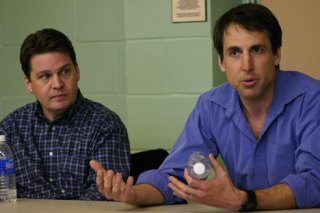Changing the way we produce and consume energy is a vital long-term commitment, so we better get it right, renewable-energy advocates warn.
“The choices we make today will be things we have to live with, and our children will have to live with,” said Michael Payne, an international wind-systems manager with Shell. “We need to get our arms around the problem.”
Payne, a Whidbey resident, spoke Wednesday night at a renewable-energy forum at Clinton Community Hall sponsored by the South Whidbey Record. Marcia Van Dyke, publisher of the Record, moderated the event and an overflow crowd of more than 60 people attended.
Joining Payne at the forum were Andy Wappler, former TV weatherman and current Puget Sound Energy public relations consultant, and Lori Christian of Whidbey Sun and Wind in Coupeville.
In his job with Shell, Payne has focused on all aspects of developing utility-strength wind systems in the U.S. and Canada.
Before joining Shell in 2002, he spent six years based in The Netherlands, managing wind-system developments in Europe and Asia, where he said most of the wind action is.
Payne said the wind industry has “grown dramatically” since gaining a foothold in 1979, and is an essential element to counteract the spread of carbon emissions created in the production of electricity, which has reached 40 percent globally.
He said the ballooning energy-consuming populations in emerging nations such as China and India make the problems of carbon supply and emissions even more critical.
At the local level, Payne urged consumers to “calculate your carbon footprint,” and to push those in government to move toward renewables.
“What we have going for us now is our awareness, and that we can ask for a choice,” he said.
Wappler said PSE has the second-largest wind-power operation in the United States. He said two current systems in Eastern Washington and a third in the permit stage will generate enough carbon-free electricity to accommodate the needs of 400,000 homes.
The newest project, which will include 800 turbines, is expected to cost $3 billion, “so it’s not cheap,” he said.
Wappler said PSE has built hundreds of giant wind turbines, each more than 350 feet tall, the equivalent of standing a Boeing 747 on end.
“If you can fit one of these things in your yard, then you have a helluva yard,” he said.
Wappler said PSE’s goal is to use wind to produce 10 percent of its electricity by 2013.
Meanwhile, he urged everyone to adapt simple measures at home to reduce individual consumption of electricity.
“We reduced our consumption by 40 percent, and it was a no-brainer,” Wappler said, by changing light bulbs and consumption behavior.
“It isn’t about doing without, it’s about doing it better,” Wappler said.
Christian’s primary task with her Coupeville company is to track legislation dealing with renewable energy, a task she said has been “an absolute whirlwind ride.”
Christian said that while “we haven’t gotten everything we wanted,” tax credits, grants and other incentives have been extended or increase for a number of renewable-energy projects.
She also said that new legislation forbids homeowner associations from prohibiting certain solar projects, that groups of individuals can create certain solar projects on property owned by government entities such as school buildings, and that under certain circumstances, bonds can be issued to create low-interest loans for energy-efficient systems.
“What we want to see is renewable-energy resources from one end of this island to the other,” Christian said.



